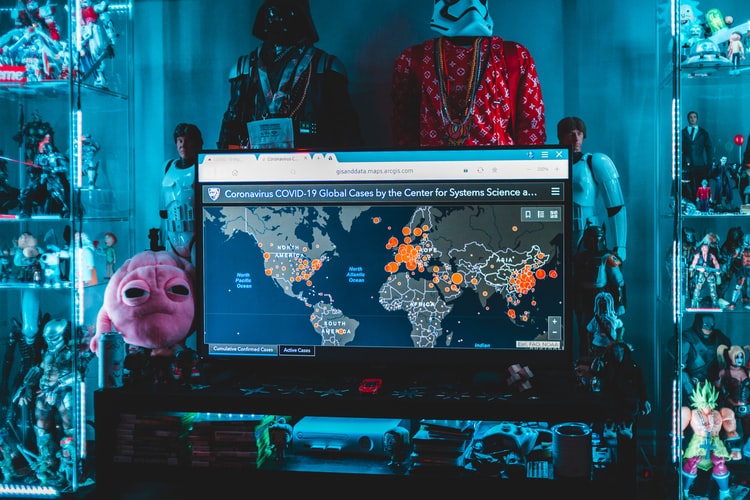Note: This information is not intended to serve as medical advice or treatment for any person. Those seeking medical advice or treatment for any condition during this time should contact a trusted medical provider.
During a pandemic between 33% to 50% of the general population will experience some form of psycho-social distress – World Health Organisation
Pandemics, like COVID-19, are extreme health emergencies that threaten our survival. They cause large-scale disruptions to the normal functioning of our communities. And they represent times of human tragedy because they are associated with large numbers of sickly and dying people. So it is unsurprising that, during these times of crisis, we find our emotional and mental capacity to cope is often pushed beyond its limits.
During pandemics, we find ourselves in a new reality that is met with uncertainty. Strain is placed on essential resources like access to groceries, health care and social services. Economic losses are felt on both a personal and global level. And there is a sleuth of misinformation and sensationalised conspiracy theories that only upend our sense of reason.
When we experience these varied forms of uncertainty, we begin to feel overwhelmed. And our natural human response is to look for a means of reprieve.
So let’s begin by taking the time to understand our feelings. We can then look at healthy ways to balance our emotions and reorient our mindset. And in this way, we are able to gently extend our emotional and mental capacity to cope in times of adversity.

Translating Our Feelings
When faced with an inability to comprehend what is happening around us, we often experience a range of emotions that are in a constant state of flux. We may feel anxious or angry in one moment. And then fearful or depressed in the next. This cycle of emotional and mental anguish makes it challenging for us to maintain a rational perspective alongside a sense of personal security.
At this point, it’s important to understand that what we are feeling is part of our natural human response to large-scale disruptions. However, repeating this cycle of emotional and mental anguish over extended periods of time can lead us to develop chronic forms of psychological distress. This can be expressed most commonly as Post Traumatic Stress Disorder, depression or substance abuse disorders.
Furthermore, those of us whom already have pre-existing mental conditions have to be extra careful during this time. We need to be vigilant of changes in our thoughts and behaviour as this will help us to maintain a healthy relationship between our emotions and our mindset.
So what can we do to maintain our emotional stability?
Balancing Our Emotions
There are three simple steps that we can follow to balance our emotional state. It takes a bit of practice but it is very effective in helping us understand and regulate what we are feeling.
1. Awareness
Our emotions are temporary and they naturally change throughout the day. Being aware of our feelings means that we recognise when our emotions change. This helps us to understand our emotional response.
2. Identification
We often experience our emotions through different parts of our body. For example, anger can manifest as shortness of breath; fear or panic can manifest as a weakness in the stomach; and joy can manifest as a warmth across the heart. By identifying our emotions, we minimise the confusion we experience when we feel overwhelmed.
3. Expression
We can use statements like, “I feel anxious” or “I feel sad”, to express our feelings once we have identified them. By putting our emotions into words, we allow ourselves to respond intentionally. This means that we choose how to respond, instead of defaulting to an automatic reaction.
Once we learn to regulate our emotions, we can work on rebuilding a rational perspective of what is happening around us.
Reorienting Our Mindset
Our mindset greatly influences how we perceive the world and what is happening around us. In short, a positive attitude is linked to an optimistic outlook whereas a negative attitude is linked to a pessimistic outlook. Despite this, there are a number of factors that can change how we interpret information. Here are three easy ways in which we can foster a more positive mindset during this time:
1. Cut Down on Caffeine
Caffeine is a high-energy stimulant that is commonly found in black tea, coffee and energy drinks. It specifically stimulates the area of the brain that causes us to feel overwhelmed. This means that it will heighten our experiences of anxiety, fear and panic. So during this time, when our emotional state is especially susceptible, it would be good practice to limit the consumption of caffeinated beverages.
2. Sleep Properly
Sleep is an invaluable aid as it allows our body to naturally rejuvenate itself. Not only do good sleeping habits promote emotional stability, but it also helps us with mental clarity. These are two key things we need to make informed decisions. During times of uncertainty, the ability to make better decisions will help us to overcome daily challenges with ease.
3. Regulate Content
What we watch, what we read and what we listen to all has an impact on our mindset. If we continuously expose ourselves to negative or sensationalised content, we are constantly triggering feelings of despair and hopelessness. Over time, this distorts our perception of reality and prevents us from having a rational perspective. By regulating the content we consume, we can uplift our emotional state and reorient our mindset.
Click to Listen to our #1 Charting Podcast on Apple & The World’s Exclusive Youth Leadership Podcast, Empathy Always Wins by EMPWR, Out Now Everywhere on Apple / Spotify / Google Podcasts 🌍
No matter where we are, each and every one of us is going through our own unique experience. Whilst some of us may have more support than others, it is our individual responsibility to ourselves to improve our lived experience during this time.
We’d love to hear from you! So please share with us some of the ways that you have found useful to cope during this time. Email us at [email protected]. For more on our COVID-19 Series, click here!
💭If you like this article, subscribe here to our EMPWR Guide and be first to receive all our articles, the latest mental health news in the Arab world and more exciting stuff every Sunday directly to your inbox.
Be sure to check out and join our global conversation around mental health on the EMPWR Facebook Community Group: “The Empower Community”
💭Freelance Submissions & Art/Poetry are accepted here (All Articles Must Comply with EMPWR’s Writing Guidelines )








